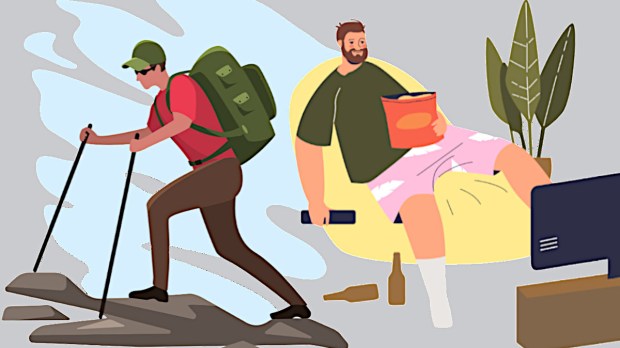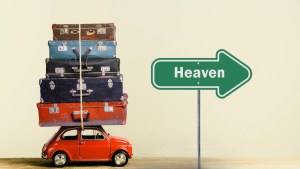Trying to relax is hard work.
That’s why we’re all so bad at it. It seems there are only two types of people when it comes to weekends.
First there are the weekend warriors, who load up a full schedule of activities and chores. This is the type of person who has their child registered for “all the sports” and spends the weekend chasing the team around from venue to venue, only pausing to rush through the drive-thru at the nearest fast-food joint. This is the type of person who tries to renovate their entire kitchen in a single weekend or decides to run a marathon on Saturday and Sunday. Or maybe they use the weekend for an overnight trip with a full itinerary in an attempt to pack in as many experiences and distractions as possible.
At the other end of the spectrum, there’s the type of person who has an extreme relax-and-chill mindset. They possess it to such an immense degree that it becomes a fault, dragging themselves out of bed late, sitting around in pajamas, overloading on television, playing videogames, and ordering take-out. They decline to meet up with friends or visit family, preferring, at most, to text now and then so they can feel that they’re maintaining an authentic social life. They “recharging the batteries” between workweeks.
Tired all the time
The first type of person might make the quip, “I need a vacation from my vacation.” The other type probably never went anywhere at all. The commonality, though, is that neither approach is conducive to true leisure. That’s why we so often feel tired after a day off work, even if we do nothing. We haven’t used the time to create true leisure. We never rested. Relaxation, the kind that is enjoyable and energizing, seems strangely inaccessible. We know that we want it, think we know how to achieve it, but fall short time and again. Thus, we stay tired. All the time.
We were created by God, remember, for the seventh day.We’re made for the sabbath. This means that the other days of the week, while productive and valuable in their own way, are not the pinnacle of human flourishing. The issue in our modern, capitalistic world is that we are so driven by economics and productivity that we have slowly lost our leisure time. We don’t value it. Sometimes our employers make it impossible. In other instances, we’ve willingly given it away.
Vegetating vs. hyperactivity
After working so hard all week, all we can do on the weekend is collapse on the couch and vegetate, worried that if we expend any energy then we won’t be able to survive the coming work week. Others have the opposite strategy and try to fit as much activity as possible into the weekend because we cannot manage to disengage from work-mode. This turns time off into its own kind of work, as if the more productive the weekend, the better it was. Both approaches leave us exhausted.
When it comes to leisure, we have our priorities precisely backwards. Both strategies, that of doing nothing because we want to be fresh on Monday morning or using the time off as a parallel to work, because we’re addicted to the stress, fail. Leisure’s relationship to work should be the other way around. We work — ideally good, honest work that is satisfying in its own way — in order to prepare for leisure. Leisure is the reason we were created. It’s our happiness.
Practicing true leisure
True leisure does require practice and effort. The first, small step is to begin valuing seemingly idle, modest, human-paced activities – gardening, reading a book, making coffee, watching birds, long meandering walks, and so on — these activities are very different than sitting around in front of a television. They don’t distract but, rather, leave us alone with our thoughts. They require a small amount of effort but allow us to breathe freely, be ourselves, and decompress.
The other stuff is all diversionary. Social media, television, needless errands, constant activity just to be doing something, all of it continues to pull us away from ourselves. This is why wasting time with constant distractions, whether they be low-energy or high-energy, isn’t restful.
Visit your grandmother, have tea with friends, watch your children play soccer (just a game or two, and then get a snow cone and hang out at the playground), go for a run in the woods, play an instrument, spend time on a hobby, and most importantly, go to Mass.
Don’t overdo it. Leisure isn’t work. But it is effort. The difference is that, when we put effort into our leisure, it rewards us with extra energy.
The rewards of leisure
The primary and best reward of leisure is the happiness it brings. The second reward is important, too, which is that leisure is the basis of culture. It’s in our leisure time that we create and build, read books and listen to music, relax in nature or take up endeavors to improve our lives. The pure and simple motivation is that these are things we love to do. As Josef Pieper points out so eloquently in his book on the topic, we are more than productive workers for an economy.
We are here to create beauty and live beautiful lives, to celebrate those beautiful lives with family and friends, and, ultimately, make those lives a precious and fitting gift to God, the creator of the sabbath and source of all happiness.



